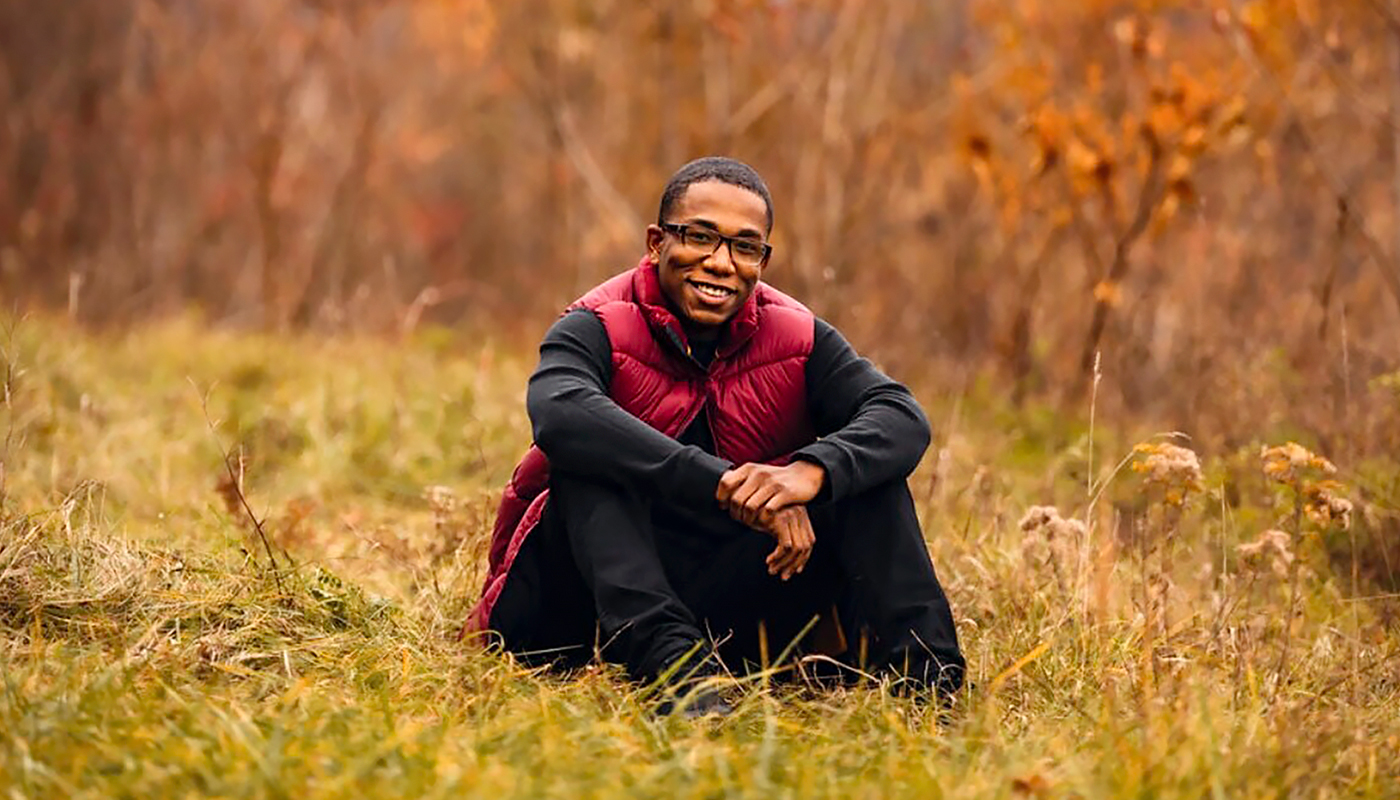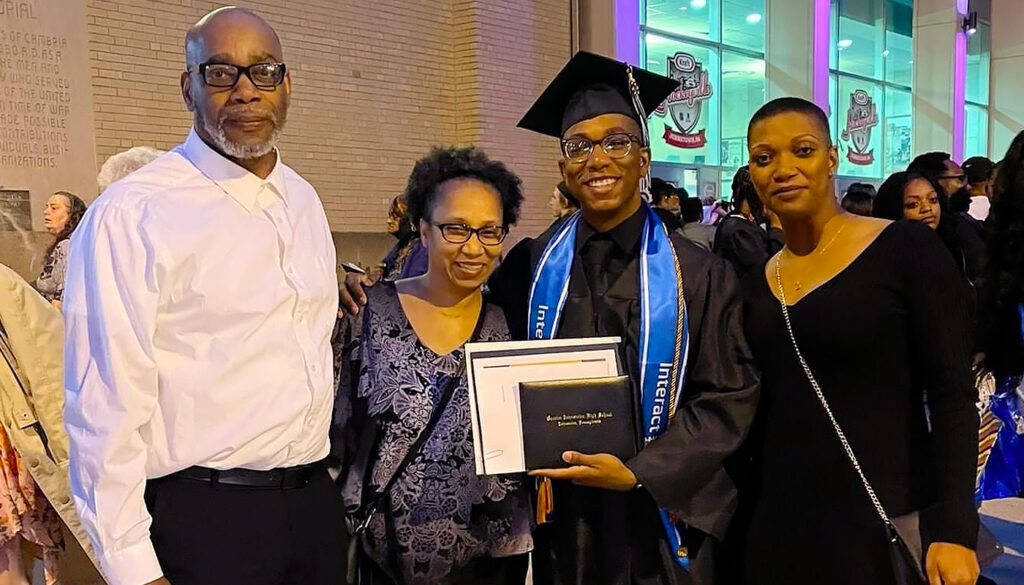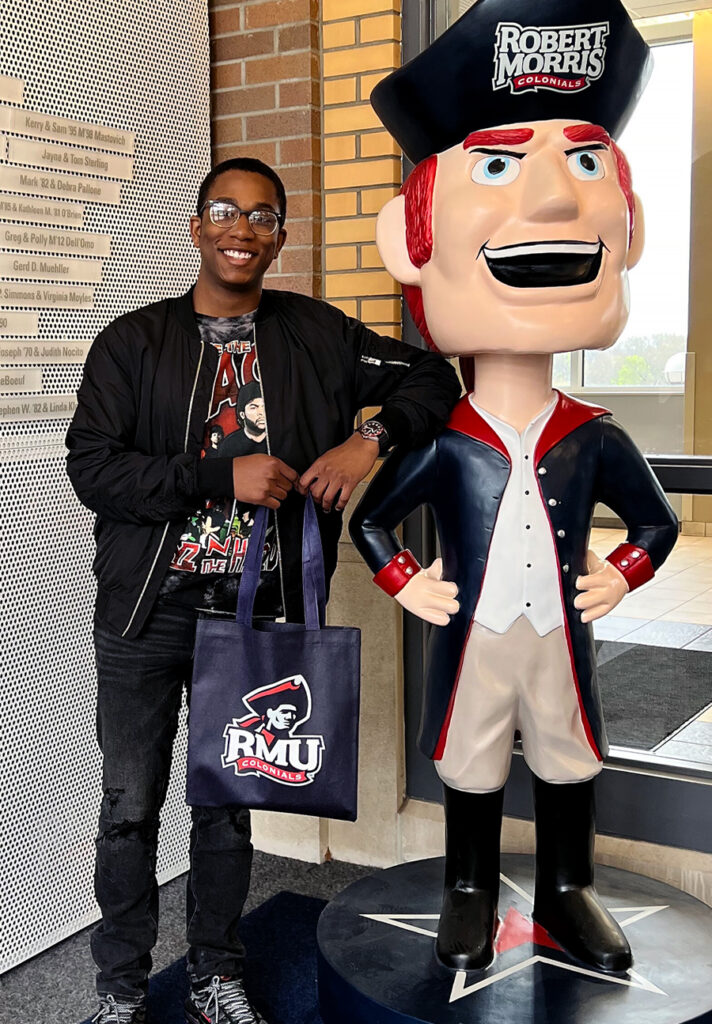
As he stared at the blank screen on his computer, Teyvon Fields began feeling overwhelmed.
It was his first finals week of his first semester in college and Fields’ mind raced with all of the items on his to-do list.
“There were a lot of essays to write, a lot of tests to study for, and it was just a lot all at once,” Fields said. “I remember thinking, ‘I’m ready to go home.’”
Home was 90 miles away in Johnstown, Pennsylvania. Fields was a freshman at Robert Morris University near Pittsburgh, where he’s pursuing a Criminal Justice major to help him achieve his goal of a career in federal law enforcement.
But the future wasn’t on his overwhelmed mind during that first finals week last December. Rather, it was advice from his past that helped him the most.
“I remembered what my mentor, Mrs. Adamy, always told me in high school,” Fields said. “If I was stressed out about an assignment, she would help me break it down, bit by bit, so it didn’t seem as big of a workload to take on. That’s what I did during finals week and I instantly felt more relaxed and confident.”

Fields, a 2022 graduate of Greater Johnstown High School, said the learning habits that were instilled in him throughout grades 9-12 helped him navigate his freshman year of college. Most notably, he felt that Greater Johnstown’s emphasis on goal-setting gave him a tremendous advantage from the moment he set foot on Robert Morris’ scenic 230-acre campus.
“It’s definitely an adjustment when you first get to college and you’re all by yourself,” Fields said. “You no longer have your teachers, or your parents, to keep you on track. You really have to set those daily and weekly goals and hold yourself accountable.”
Independent and goal-oriented
At Greater Johnstown, Fields’ classrooms used the Summit Learning program, which he said helped him with self-direction and taking responsibility for his own learning plan. Fields also was able to learn skills that went beyond the classroom, and allowed him to increase his confidence in other aspects of his life.
Fields said being in college for a year allowed him to understand how important it is for students to develop their whole self in order to thrive after high school.
“Summit is really geared to helping you on whatever path that you decide to take,” Fields said. “The things that you learn in Summit are going to be utilized and used in any way, shape, or form you take after graduation.”
Fields also appreciated the connections he made with his high school teachers, especially his mentor, Melissa Adamy. The two met weekly in regular one-on-one mentoring sessions to discuss his goals, both short- and long-term.
“She always pushed me, and she always made sure to tell me she was proud of me,” Fields said.
After starting college in August 2022, Fields said he didn’t really hit his first “mental wall” until October. That’s why it was perfect timing when he received a phone call that fall from Mrs. Adamy to check in on him.
“I really needed that and her words helped calm me down and get refocused,” Fields said. “It wasn’t really anything she said, but more of how she said it, and how encouraging she was.”
Adamy reminded Fields that college is a time to take risks and try new things, while also becoming more independent and goal-oriented.
“With no set schedule like you have in high school, you really have to find that balance between the classes and all of the free time,” Fields said. “You can’t just sleep all day. You have to set goals and figure out how you’re going to cross each goal off your list.”
Fields began breaking his coursework down into doable daily tasks. For a longer written assignment that wasn’t due for a week, he would set a goal of writing a little bit of it at a time each day. As his goal-setting rhythm took hold, Fields found himself more open to enjoying other aspects of college life.

He loved going to Robert Morris college basketball games and made several new friends after joining the Criminal Justice Society, which provides members with hands-on educational and networking opportunities within the criminal justice and law enforcement communities.
“I definitely want to keep making a difference and learning new things about the law,” Fields said. “All of the critical thinking we did with Summit in high school has definitely come in handy in those areas.”
‘The accountability factor’
Fields also appreciated the simple pleasure of relaxing in his dorm room and connecting with neighbors to form a hallway community.
“As students, sometimes it’s really important to take a break and say, ‘Let’s not think about schoolwork right now,’” Fields said. “Take a break, relax, have fun for a little bit, and then we’ll get back to the work and finish it.”
As the school year progressed, Fields naturally began serving as a bit of a mentor to his fellow college freshmen and shared many of the learning habits he formed in high school. Then, in February, he was able to truly display his own mentoring skills when he returned to Greater Johnstown High School for the first time since graduating.
Fields initially made the visit to reconnect with teachers such as Mrs. Adamy. He soon realized he had a lot of helpful advice to offer the high school students as they prepared for their own post-graduation journeys.
“Being able to talk with the seniors and seeing them in the same shoes that I was in just the year before was kind of special to me,” Fields said. “And then chatting with all the teachers and realizing that they still genuinely cared about me even after I got my diploma. That really meant a lot.”
After working a summer job back home in Johnstown, Fields is eager to return to Robert Morris and challenge himself to grow in new ways as a college sophomore.
“The accountability factor is the main life skill I took from high school,” Fields said. “Because obviously in college, you’re now a grown up. People are going to trust that you’re going to make the right decisions on your own. Nobody’s going to chase you down to keep you in line. It’s all up to you to do that here.”

